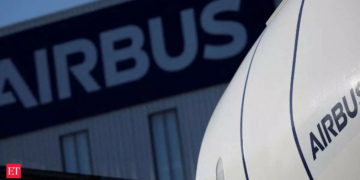The retail phenomenon of 2021 is not a new fashion craze, electronic gadget or children’s toy. The most discussed items in today’s shops are “empty shelves”. And as the problems have grown, the arguments have raged: was it Brexit? Is it the pandemic? Is it a UK problem or a worldwide issue?
In fact, though both the pandemic and the new restrictions on EU trade and free movement have contributed to shortages on the shelves and to companies cutting their production despite demand, the roots of this market failure predate both by decades.
Worse, the crisis of labour across the UK – affecting businesses from haulage to food, farming, retail and construction – is now so deep that better wages alone will not dig us out of it.
To understand the underlying causes, take a look at the informal lorry parks just off our motorway network, or the laybys along the main roads to England’s ports. I visited one such HGV parking place just off the M25 last year to interview hauliers making deliveries for major transnational retail and e-commerce businesses. The “park” was a rough field of grit and mud laid out around a block of open-air showers with cattle-trough sinks and a small transport cafe. The signs were in Russian as well as English, acknowledging the fact that more than half of the scores of lorries parked there were driven by migrants from Ukraine and Belarus, working for Lithuanian-registered EU companies.
Some of the drivers had been on the road, far from home, for six months or more. They slept in their trucks week after week, washed themselves and their clothes by the roadside, and often went to the toilet by the roadside too. Cooking a meal over the naked flame of a camping gas stove in the lee of a juggernaut with 800 litres of diesel in its tank counted as a rest. Their pay was pitifully low and the cost of a proper trucking hotel not accounted for in it.
HGV driving work is highly skilled and used to be characterised by direct employment and strong unionisation. It is also highly regulated, for good reason – a fully laden 44-tonne truck with a driver who has not been properly rested can quickly turn into a killing machine. Rules to protect both drivers’ and public safety may exist, but in the truckers’ experience enforcement is lax, particularly in the UK. One Ukrainian driver told me he feared being stopped and fined when forced to break the rules in Germany, France or Austria, but “not so much in the UK”, which he believed “closes its eyes”.
British haulage companies, still trying to run on the old-fashioned principle that a driver ought to get home for a couple of days of family life at least once a month, told me they could not compete. They are increasingly required to bid for haulage contracts on new Uber-style platforms run by e-commerce sites that set the price and precise timeslots for warehouse collection and delivery in a one-way auction.
The technological revolution in the 1980s and 1990s, with its electronic tracking and advanced traffic-control software, led to dramatic upheavals. It enabled industries to switch to a globalised system of just-in-time ordering with hugely extended supply lines. The jobs have also been made to bend to the iron brutality of 24/7 computer-controlled efficiency.
The pattern is the same in other sectors now suffering acute labour shortages. Harvesting crops has always been tough, dirty work; gangs of workers used to do it for relatively contained hours over short periods of the year or in shifts around school hours. Now rolling 12-hour-plus shifts, seven days a week, are common.
Meat factories used to treat working late or at weekends as optional overtime for extra money. Now workers are expected to sweat at an abattoir’s capital intensive plant, for as long as it takes the owners to supply supermarket orders, for a flat hourly rate.
Conditions, as much as pay, underlie the refusal of British workers to do these jobs. They are not, as some cabinet ministers would have us believe, idlers who prefer their paddleboards to a bit of graft, but industry has made these vital jobs incompatible with any normal settled life. Only desperate people, from poorer countries, will take them, and then only long enough to earn what they need to establish a better life back home, or long enough to learn English and move up the employment ladder in Britain.
These conditions have depended not just on migration but on an unending cycle of new migration, drawing people in from ever-further east, as successive eastern European nations improve their living standards and their workers no longer seek what hauliers call “tramping”. Recruiters are now finding their new cheap HGV drivers not in Poland, Hungary or Romania, but in the former Soviet Central Asian states of Uzbekistan and Tajikistan.
Greater automation has always been held up as the answer to labour problems. Short of HGV drivers? Don’t worry, driverless trucks are round the corner. Not enough workers to harvest your crops or slaughter your pigs? Invest in machines to do it. Experience gives the lie to this wishful thinking.
Walk behind a state-of-the art lettuce or leek-harvesting rig – all gleaming investment with computerised grading systems, integrated veg-washing conveyor belts, and dazzling floodlights – and you will still find dozens of workers, bent double from before dawn to well after dusk, pulling food from the earth. Stand in a supermarket packhouse and watch arrays of digital cameras calculate in seconds the percentage of blush to green on apples as they pass down an automated line (so those not rosy enough are thrown into a bin), and you’ll still find armies of tired people operating the system.
New technology has indeed created a distribution system that is miraculous in its sophistication and in the returns it gives to capital, but it is built on a fatal flaw. Workers are not automata in some Fritz Lang Metropolis-type dystopia. And automation itself doesn’t eradicate the mindless jobs but has a way of creating new forms of drudgery with every leap forward.
This is not a world in which the market keeps labour supply and demand in balance. It is a dysfunctional market in which a handful of large companies dominate each sector. Their buying power is so great that suppliers faced with a need to pay higher wages cannot pass the cost on. Successive governments have used immigration as a wages policy, to put downward pressure on earnings rather than tackle this tendency to oligopoly. Now the government wants immigration to stop, the problems it papered over have been exposed.
Decades of anti-union legislation has tilted what was always an unequal relationship between workers and capital even further in the latter’s favour.
The solution requires a breaking of the structures which reinforce and accelerate this power imbalance, and an overhaul of the relationship between labour and capital, so that work not only pays but is human too. Yes, it will reduce corporate profits. But ignore the social costs of a hyperlean supply chain, and you may find you have created a system so economically efficient for business that it collapses altogether.














